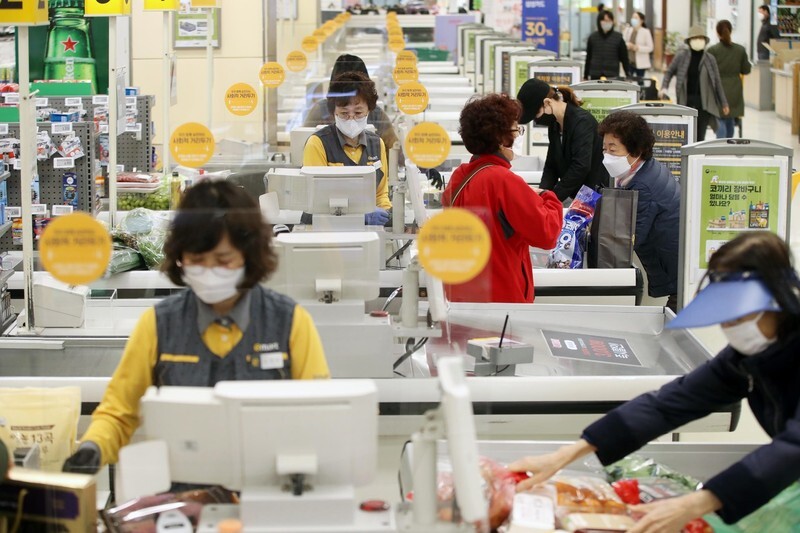hankyoreh
Links to other country sites 다른 나라 사이트 링크
S. Korean scientists verify presence of “neutralizing antibodies” in COVID-19 patients for first time

The antibodies detected in patients where COVID-19 has reactivated are "neutralizing antibodies” that are capable of resisting the virus after infections, an analysis shows. But around half of these patients were found to have the virus still present in their respiratory organs despite the presence of neutralizing antibodies. This marks the first time disease control authorities have verified neutralizing antibodies for the novel coronavirus.
"Interim findings from analytical testing to determine whether the virus could still be detected after antibodies had formed following recovery from coronavirus infection showed that all 25 confirmed patients had formed neutralizing antibodies capable of resisting the virus after infection,” said Korea Centers for Disease Control and Prevention (KCDC) Director Jung Eun-kyeong in a regular briefing on Apr. 22. The South Korean government previously performed neutralizing antibody testing on 25 randomly selected patients who had tested positive for the coronavirus a second time after being declared fully recovered. A neutralizing antibody is a form of antibody that exhibits protective capabilities in terms of resisting viruses following infection.
But 12 of the reactivation cases with neutralizing antibodies -- nearly half -- tested positive in genetic testing for the virus.
"It may be surmised that the virus may not be completely eliminated even after neutralizing antibodies have formed, and that the periods over which it remains in the body may vary from patient to patient,” Jung said, adding that "additional research is currently being performed.”
“Additional culture testing for the virus was performed on 12 patients, but they were found to be negative in primary testing,” she continued. KCDC plans to continue performing neutralizing antibody testing on other patients who test positive a second time. A total of 207 people had been re-diagnosed with the novel coronavirus as of Apr. 22.
Meanwhile, disease control authorities called on senior citizens and children with weak immune systems to receive inoculations for other diseases even amid the coronavirus pandemic.
"Amid the coronavirus outbreak, visits to healthcare institutions have declined, and the Streptococcus pneumoniae inoculation rate for seniors aged 65 and over has fallen to a third of what it was last year,” Jung noted.
"Even amid the coronavirus outbreak, seniors and children should continue to receive safe inoculations while observing infectious disease prevention rules,” she urged. Disease control authorities plan to develop an online and mobile-based reservation system for inoculations to prevent rushes of people receiving them at the same time.
By Kwon Ji-dam, staff reporter
Please direct comments or questions to [english@hani.co.kr]

Editorial・opinion
![[Column] When ‘fairness’ means hate and violence [Column] When ‘fairness’ means hate and violence](https://flexible.img.hani.co.kr/flexible/normal/500/300/imgdb/original/2024/0516/7417158465908824.jpg) [Column] When ‘fairness’ means hate and violence
[Column] When ‘fairness’ means hate and violence![[Editorial] Yoon must stop abusing authority to shield himself from investigation [Editorial] Yoon must stop abusing authority to shield himself from investigation](https://flexible.img.hani.co.kr/flexible/normal/500/300/imgdb/original/2024/0516/4417158464854198.jpg) [Editorial] Yoon must stop abusing authority to shield himself from investigation
[Editorial] Yoon must stop abusing authority to shield himself from investigation- [Column] US troop withdrawal from Korea could be the Acheson Line all over
- [Column] How to win back readers who’ve turned to YouTube for news
- [Column] Welcome to the president’s pity party
- [Editorial] Korea must respond firmly to Japan’s attempt to usurp Line
- [Editorial] Transfers of prosecutors investigating Korea’s first lady send chilling message
- [Column] Will Seoul’s ties with Moscow really recover on their own?
- [Column] Samsung’s ‘lost decade’ and Lee Jae-yong’s mismatched chopsticks
- [Correspondent’s column] The real reason the US is worried about Chinese ‘overcapacity’
Most viewed articles
- 1China calls US tariffs ‘madness,’ warns of full-on trade conflict
- 2[Column] When ‘fairness’ means hate and violence
- 3[Column] US troop withdrawal from Korea could be the Acheson Line all over
- 4Could Korea’s Naver lose control of Line to Japan?
- 5[Editorial] Yoon must stop abusing authority to shield himself from investigation
- 6[Column] How to win back readers who’ve turned to YouTube for news
- 7DongA Ilbo and the government are told to apologize for past civil rights violations
- 8S. Korea’s spy agency ramping up national security investigations to keep itself relevant, critics s
- 9A Korean production studio may have made your favorite show – even if you don’t watch K-dramas
- 10[Column] Samsung’s ‘lost decade’ and Lee Jae-yong’s mismatched chopsticks